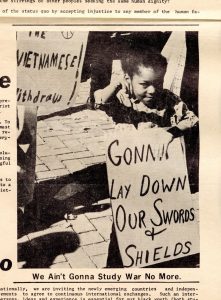This month at the Planned Environment Therapy Archives and Special Collections we are recognising Black History Month through a series of social media posts on our Twitter and Facebook feeds (watch this space!). We are also looking at how we can work across the Mulberry Bush to support inclusion work with both staff and children throughout the year.
Taking part in awareness months is something we try to do pro-actively as an archive. However, an attitude of ‘I’ll save that for Black History Month’ can all too easily prevail. Without care being taken, there is a risk that it will become a tick boxing exercise. To combat this, we are constantly trying to diversify our collections and consciously draw out Black voices.
As we work to catalogue and process the archives, we edit descriptions to reflect a more positive attitude towards Black culture. We do this in a way that does not edit history, just our catalogue descriptions. There is no need for us as current staff of the Mulberry Bush to describe our collections using archaic and racially offensive language. It is not appropriate for us as archivists to passively accept language which was ‘just what they used to say in the old days’. If anything, we have a responsibility to acknowledge the awful and derogatory way that Black people and culture have at times been written about in the history books. We do this by using content warnings on our online catalogue, and sensitively managing people’s expectations before they access the material. Remaining transparent about content means we are not complicit in racial bias.
Archives have a role to play in making positive changes – we learn from the past. One of the most popular collections at the archives is the Personal Papers of Dr Joseph Berke. The papers include the organisational records for the Dialectics of Liberation Congress hosted by Berke, Cooper and Laing in 1967. The collection features original material relating to the Civil Rights Movement in the U.S.A, with notable correspondence from Kwame Ture (Stokely Carmichael), Dr Martin Luther King and journalist William Worthy amongst others. The anti-war poster below was sent to Berke by Worthy in protest of the numbers of Black soldiers being sent by the U.S.A government to fight in Vietnam (Ref. PP/JB/IPS):
For two years running we’ve used this collection to facilitate a discussion around race, inequality and displacement with the Baobab Survivors group (I am always conscious of the fact that I am a white British woman telling a group of African, Malaysian, Syrian refugees about Black history and try to acknowledge what this means for the group, if anything). The discussion on both occasions has centred around the use of violence and war in order to fight for basic, civil rights. This year we were joined by an Archives and Records Management intern from the University of the West Indies, who’s name I shall not mention for confidential reasons, based in Trinidad and Tobago. She was able to share how the Black Power movement had impacted Trinidad’s history and her current work as an archivist, and how Ture was banned from Trinidad for fear of inciting a racially motivated riot. The complexities of this discussion hit us both; here we were discussing Ture’s exile in the same context as Dr King’s achievements with a group of people who had experienced racial and political exile in 2022.
Footage from the Dialectics of Liberation Congress shows Ture arguing with the predominantly white crowd: ‘What have YOU done to survive? What have YOU done to stop racism? I’m fighting for my life! I’m fighting for my survival!’. At that point Dr King was still alive, only to be assassinated a year later. Malcolm X had been assassinated two years before, and Medgar Evers two years before that. Whether we agree or not with Ture’s approach, he makes a powerful call to action on racism that remains just as relevant today.
There are many questions which need answering in relation to Black history and therapeutic communities; many of the founders of therapeutic communities were white, middle class, and well educated. Why have Black men been historically underrepresented in prison therapeutic communities? Do the archives misrepresent Black therapeutic community history? Or was it never there in the first place? Black History Month is a reminder to us as archivists that the answers lie within the records, and it’s our job to catalogue and describe with transparency so that Black voices, like those of Dr King, Ture and Worthy as well as figures who are less well remembered by history, continue to have a presence.
To get involved with BHM: https://www.blackhistorymonth.org.uk/
To learn more about the work of Baobab Survivors: https://baobabsurvivors.org/content/psychotherapy-activities
To learn more about the collections at the Planned Environment Therapy Archives and Special Collections: https://archives.mulberrybush.org.uk/
Email Debra directly: [email protected]

